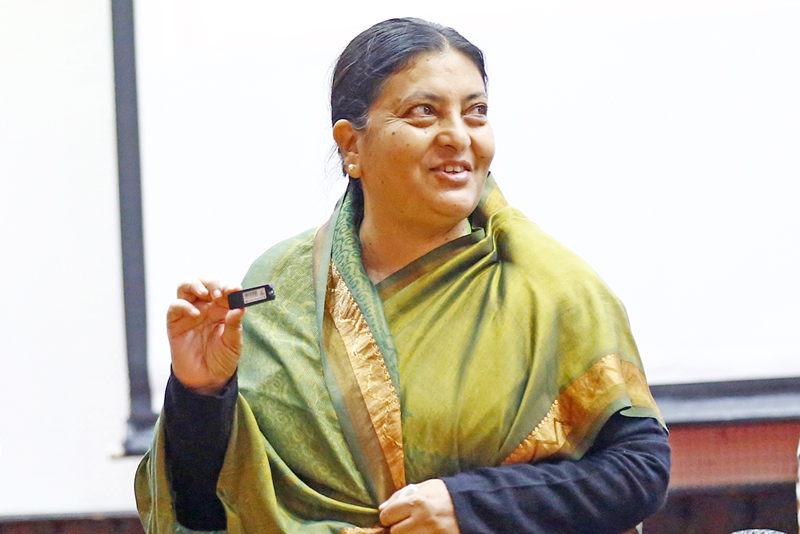Prez receives digital signature
Kathmandu, December 2
Radiant InfoTech Nepal (RIN), in coordination with Nepal Certifying Company (NCC), today launched the digital signature for the first time in the country, ending years of lingering over introduction of the tool to validate the authenticity of documents filed online and make electronic data transfers more secure.
The first three digital signatures were handed over to President Bidhya Devi Bhandari, Prime Minister KP Oli and Information and Communication Technology Minister Sherdhan Rai.
“The introduction of the digital signature is a milestone in promotion of electronic governance. This will make online services more secure,” President Bhandari said.
With the handing over of signatures to the President, PM and ICT Minister, RIN, the certifying authority, has formally opened digital signature registration for the public.
“Those interested can now approach us and get digital signature,” NCC Chairman Biplav Man Singh told a press meet organised here today.
Digital signature here is provided in a token — a USB drive — which is password protected. Users will have to pay
Rs 2,500 to obtain the digital signature in a token.
Digital signature is a set of public and private keys. The private key is used to encrypt the data, such as e-mails or digital documents. The public key is used by the recipient to decrypt the data. These keys basically authenticate the sender’s identity.
Digital signature also adds another layer of security to passwords that are currently being used to ensure security of data transferred online. Many governments around the world have made the use of digital signature mandatory for online financial transactions or electronic transfer of documents.
“However, digital signature introduced in the country can only be used at consumer level at present,” said NCC Director Deepak Bhandari. This means the signatures cannot be used while sending data, such as digital documents, to private business organisations or government offices.
“RIN is currently preparing a report on technical requirement of various government offices so that they can build necessary infrastructure,” said Birendra Mishra, comptroller of the Office of Controller of Certification, the root certifying authority of Nepal.
For now, the government is planning to develop necessary infrastructure at the Office of Company Registrar (OCR), the Inland Revenue Department and the Customs Department to promote the use of digital signature in the country
Once this is done, one can easily register a company at the OCR and file various tax or customs related documents without even stepping into the respective government offices.
Although the OCR currently allows one to register a company online, one has to later submit hard copies at the office by manually signing them. This is because digital signatures are not in use till date. The same is the case with online financial transactions.
One of the reasons why many discourage online data transfers without use of digital signature is lack of legal validity. But once digital signature is used to send documents electronically, a report goes to the certifying authority and root certifying authority and confirms sender’s identity. This can later be used as evidence in the court to prove that the sender had sent those data.
“So, once people start using digital signatures to send data online, the transfers will become legally valid and secure as well,” said Mishra.






